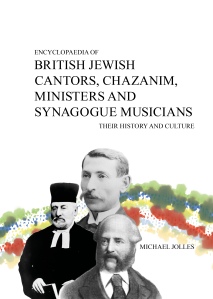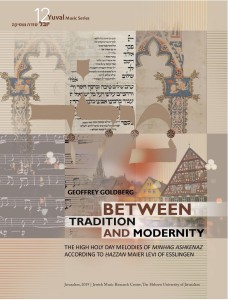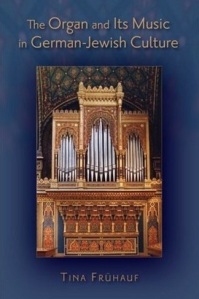You are currently browsing the tag archive for the ‘Liturgical Music’ tag.
Encyclopaedia of British Jewish Cantors, Chazanim, Ministers and Synagogue Musicians: Their History and Culture. Michael Jolles. London: Jolles Publications. 2021.
Reviewed by Judith S. Pinnolis

Without question, this monumental work of nearly 900 pages (and growing) is a vast achievement and watershed moment in the history of Jewish music in the United Kingdom. The volume gathers and documents a vast historical record in a single compendium. Historian Michael Jolles has created an unparalleled resource available to anyone with an internet connection. While supported by an editorial board, the work displays the views and perspective of a single individual, which Jolles has dubbed a “framework” for the study of British chazanim (the religious prayer leader), synagogue musicians, and institutions. The work also includes lists of rabbis, composers and others contributing to synagogue music. The detailed facts and figures collected represent an amalgamation from myriad archival and research resources into an organized collection. The volume is organized in two main parts. The first describes the roles of the various musicians of the synagogue and the attending historical and cultural backgrounds, which serve as introductory materials, and the second consists of a collection of biographical sketches of various lengths and depths, which date from names known as early as 1656 up to the present.
Read the rest of this entry »Between Tradition and Modernity: The High Holy Days Melodies of Minhag Ashkenaz According to Ḥazzan Maier Levi of Esslingen. Geoffrey Goldberg. Jerusalem: Jewish Music Research Centre – Hebrew University of Jerusalem. 2019.
Reviewed by Marsha Bryan Edelman

Ethnomusicologist Abraham Zvi Idelsohn (1882-1938) put the study of Jewish music on the scholarly map with the publication of his 10-volume Thesaurus of Hebrew Oriental Melodies (Leipzig: Breitkopf & Härtel et al., 1914–32). Long considered an authoritative resource, Idelsohn’s work has come under some scrutiny by more recent research and by the discovery of additional materials that complement, and occasionally contradict, Idelsohn’s conclusions. The Yuval Music Series, launched by the Jewish Music Research Centre at the Hebrew University of Jerusalem in 1989, has endeavored to provide a sequel to Idelsohn’s research. Geoffrey Goldberg’s Between Tradition and Modernity: The High Holy Day Melodies of Minhag Ashkenaz according to Hazzan Maier Levi of Esslingen is Volume 12 in the Yuval Series, and a most worthy contribution.
Maier Levi (1813 – 1874) is not a well-known name in the history of cantorial music, nor was Esslingen a major center of Jewish life. What makes the present work so valuable is that Levi served as a teacher of hazzanut and prepared his compendium as a study tool for his students at the Esslingen Teachers Seminary from which Levi had also graduated, although at the time, training in hazzanut was very limited; Levi enhanced his own cantorial knowledge through private study with other local hazzanim. In addition to providing details about Levi’s life and career, Goldberg also recounts the history of the types of training available to nineteenth-century hazzanim in Germany (only some of which Levi himself experienced). The key takeaway from this historical background is that Levi lived and taught at a pivotal moment brought about through the Emancipation of German Jewry (1848) and the aesthetic revisionism of the emerging Reform movement (1819). His compendium, completed over the course of many years (1845-late 1860s) thus reflects the changing musical styles Levi and his students would have experienced, and his notations reflect the evolution from “old-world,” often highly embellished tunes, to the more “modern” and unadorned chants in vogue during his later years.
Read the rest of this entry »A Fusion of Traditions: Liturgical Music in the Copenhagen Synagogue. Jane Mink Rossen and Uri Sharvit. Odense: University Press of Southern Denmark, 2006. 156 pp. + supplemental CD. ISBN 978-8-7767-4038-2
Jewish liturgical music presents a wonderful example of the way that local traditions emerge out of historical and political processes. Its content and style are often deliberately traditionalist, aiming to connect contemporary listeners to a history stretching back to the days of the prophets. That history is a complex one, however, involving thousands of years of migration, factionalism, and local variation, each of which have left their traces in the ethnic and cultural composition of any Jewish community. A Jewish service, especially a holiday service, contains a number of distinct musical events, and each of these requires a choice among the musical traditions associated with the different elements of the local community. In the music of its liturgy, therefore, every congregation literally sings out the unique fusion of traditions that make up its distinctive history. Read the rest of this entry »
The Organ and Its Music in German-Jewish Culture. Tina Frühauf. New York: Oxford University Press, 2009. 296 pp. ISBN 978-0-1953-3706-8
Recent studies in Jewish art music have contributed significantly to an emerging continuum of Jewish identities in Western music, from the St. Petersburg Society for Jewish Folk Music, to Ernest Bloch’s “Jewish cycle,” to Leonard Bernstein’s symphonies[1]. Dealing with the migration of liturgical and paraliturgical Jewish musics into Western art music, these studies try to assimilate “Jewish music” into the expanding canon of Western music while struggling with both the historical lagging of Jewish musical literacy and the pitfalls of essentialism. In the process, scholars find themselves harassed by the many sonic stereotypes that connote with “Jewish music” and are in urgent need of dispelling. Tina Frühauf’s book highlights such a stereotype, but in an inversion: the introduction of the organ, regarded emblematically as Christian (3), into the synagogue and the way it stimulated liturgical, paraliturgical, and art music—even as it “remained an oddity for Jews and non-Jews alike” (viii).
Perspectives on Jewish Music: Secular and Sacred. Jonathan L. Friedmann, ed. Lanham, MD: Lexington Books, 2009. 162 pp. ISBN 978-0-7391-4152-6
Perspectives on Jewish Music, a collection of five essays addressing music in contemporary Jewish culture and personal Jewish history, is edited by Jonathan L. Friedmann, a cantor, string player, and author. In his introduction, Friedmann describes music as a tool of cultural preservation and emphasizes the role of music performance in defining Jewish personal and group identities throughout the Diaspora. Because of the many different contexts and conditions of Jewish life in the twentieth century, music has played a variety of roles and reflects a broad diversity of influences. This multiplicity of Jewish musical experiences is reflected in the disparate subjects of the book’s chapters.





